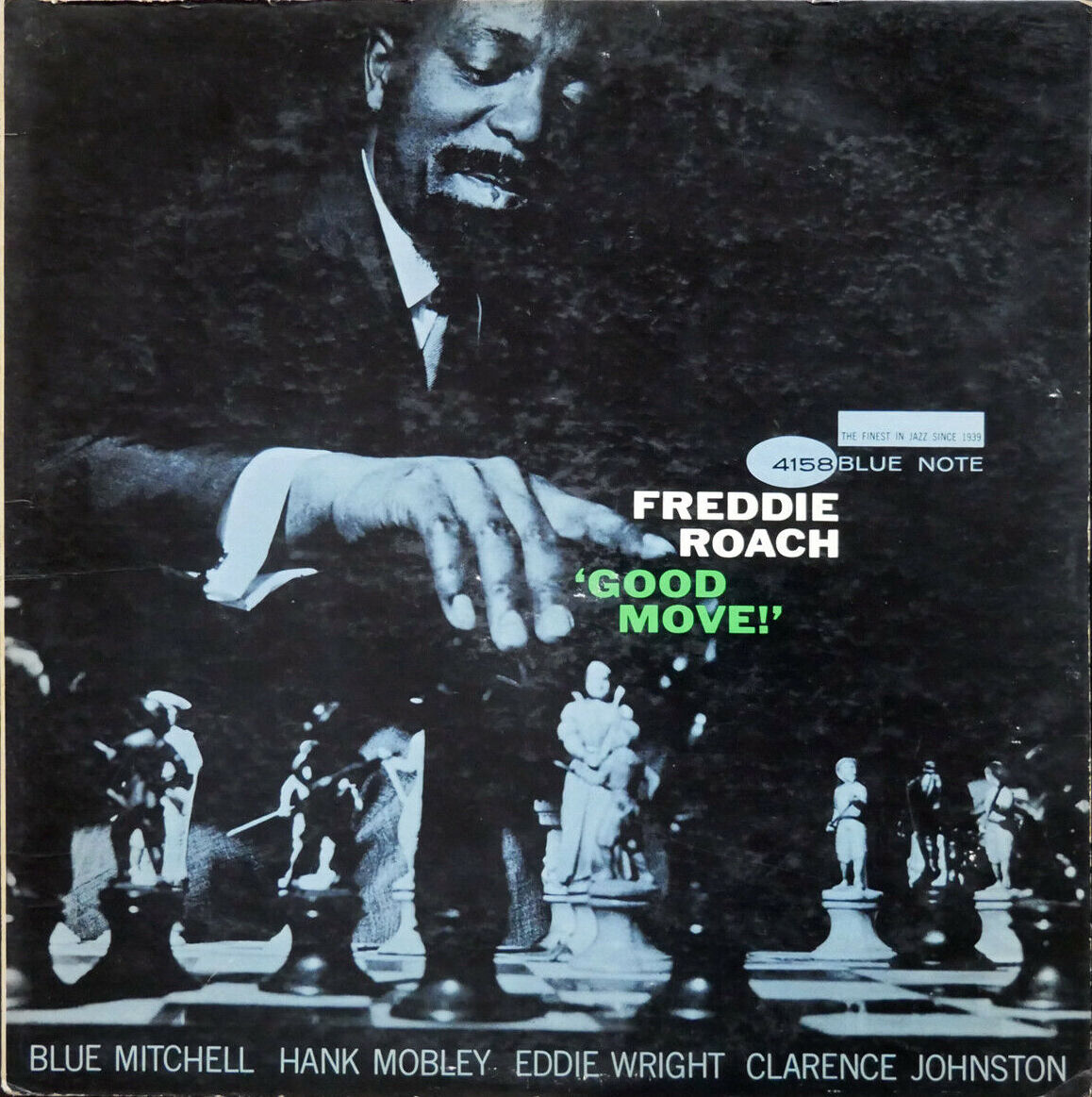Checkmate: there’s no escaping the dynamic and tasteful organ playing of Freddie Roach.
Personnel
Freddie Roach (organ), Blue Mitchell (trumpet A2, A4, B1 & B3), Hank Mobley (tenor saxophone (A2, A4, B1 & B3), Eddie Wright (guitar), Clarence Johnston (drums)
Recorded
on November 29 & December 9, 1963 at Van Gelder Studio, Englewood Cliffs, New Jersey
Released
as BST 84158 in 1964
Track listing
Side A:
It Ain’t Necessarily So
When Malinda Sings
Pastel
Wine, Wine, Wine
Side B:
On Our Way Up
‘T Ain’t What You Do (It’s The Way You Do It)
Lots Of Lovely Love
I.Q. Blues
Freddie Roach is remembered primarily by his run of LP’s on Blue Note. It was a fruitful period for the New York City-born organist. His stint of leadership dates in the early and mid-sixties, five in all, was bookended by guest appearances on Ike Quebec records in 1960 and Donald Byrd’s I’m Trying To Get Home in 1965. Jimmy Smith’s popularity was impossible to beat – The Boss had traded Blue Note for Verve in 1963 – but the Afro-American community was enamored by Roach and his singles did well on the jukebox charts, especially Mo’ Greens Please. His albums Down To Earth, Mo’ Greens Please, Good Move, Brown Sugar are perennial favorites.
Pure B3 ‘artiste’, Roach handled his gritty and greasy repertory with care, peppering it with unmistakable gospel feeling while moving his lines with elegance and a canny sense of dynamics. Although Blue Note Roach is the apex of his career, Prestige Roach – he recorded three albums for Bob Weinstock’s label in 1966/67 – is a noteworthy hodgepodge of soul jazz and Latin-tinged jazz, finished off with quirky spiritual desserts. The title of Avatar from The Soul Book speaks volumes.
Attracted to philosophy and esoterica all along, Roach was widely known among colleagues as an intellectual and playwright, even going as far as presenting plays in his garage at home in Newark. In fact, the sleeve of The Soul Book shows Roach holding one of his plays in his hands. He did bit parts in movies and relocated to Los Angeles towards the end of his life, reportedly pursuing a career in theatre. Good move? Well, Roach passed away in California in 1980 at the age of 49. But you only live once and Mr. Roach was the opposite of 9 to 5, living creative life to the full.
Speaking about good moves, Good Move is prime Roach (considering the sleeve, likely prime Roach as a chess player as well), a subtle shift away from the chitlin’ jazz of Mo’ Greens Please and stepping stone to the burned rubber of Brown Sugar. Accompanied by drummer Clarence Johnston, guitarist Eddie Wright and major-league label mates, trumpeter Blue Mitchell and tenor saxophonist Hank Mobley, Roach is in his element. The tunes flow elegantly, the band keeps a solid groove and there’s a unity of sound and purpose that makes these Blue Note’s Hammond heart food of the highest order, Grandma’s unforgettable apple pie putting the corner bakery to shame.
It is the second appearance of Mobley on an organ record, the first being Jimmy Smith’s A Date With Jimmy Smith Vol 1 & 2, the last being Grant Green’s I Want To Hold Your Hand with Larry Young, great company and why not merging with the hot tamales of the B3, Hank Mobley cooks and his sophisticated lines blend nicely with the artful grease of giants as Smith, Young and Roach, even if they hardly represent a Mobley career high. The other hard bop champion, Blue Mitchell, snappy here as a fox, buoyant and bluesy, was an organ combo regular. He recorded with Jimmy Smith, Jimmy McGriff, Richard “Groove” Holmes, Big John Patton and preceding Good Move flexed his muscles with Brother Jack McDuff on Harold Vick’s Steppin’ Out. Such a great bunch and, eventually, such a sad loss, Mitchell perishing in 1979 at age 49, Roach passing away in 1980 at age 49 and Mobley steppin’ on a rainbow in 1986 at the age of 55, destitute, burned out, sick and tired. But for many decades now living like a torch light in the hearts of jazz fans around the globe.
The beauty is in the approach of Roach, who commands the diverse components of the organ – generally acknowledged as an “awkward” instrument at heart, a beast that’s hard to tame – like a puppeteer, shifting sounds ever so slightly, tapping the pedals and the bass keyboard notes with effortless swing and letting ideas flow with logic. This man’s got class. He loves to swing on the shuffle beat, as is evidenced by Roach originals as On Our Way Up, Lots Of Lovely Love and Wine, Wine, Wine, which alludes as much to the party songs of Wynonie Harris, Floyd Dixon or Smiley Lewis than to the sermons of the preacher at the downtown church. All of them use smashed grapes to great effect one way or the other.
Varied tonal colors mark the jaunty ‘T Ain’t What You Do (It’s The Way That You Do It) and his succinct ballad reading of Erroll Garner’s Pastel. Roach’s workout of It Ain’t Necessarily So moves from waltz to 4/4 and finds Roach at the zenith of his ability to tell a short story. We’re just pawns in his hip and tasteful game.

